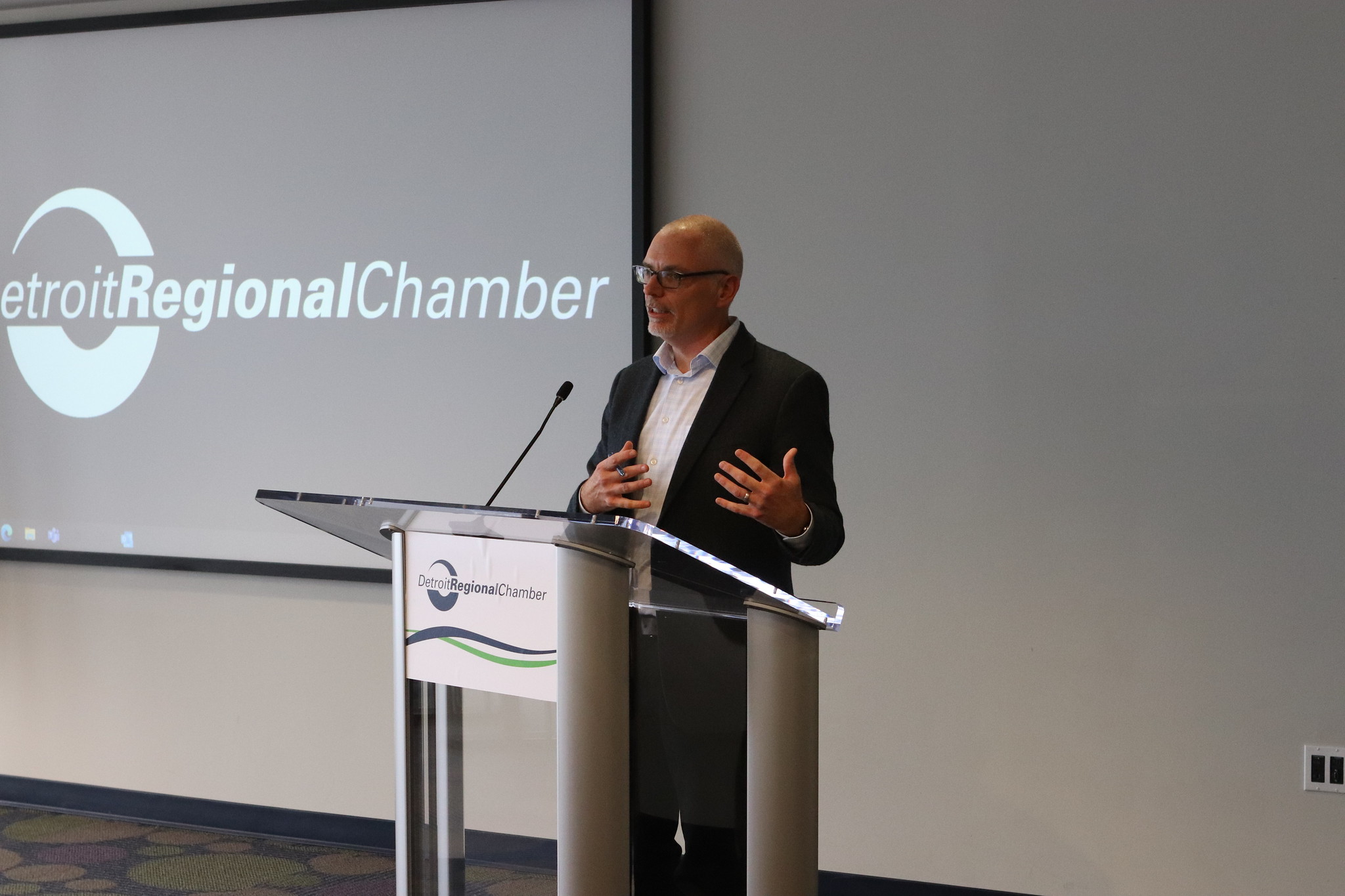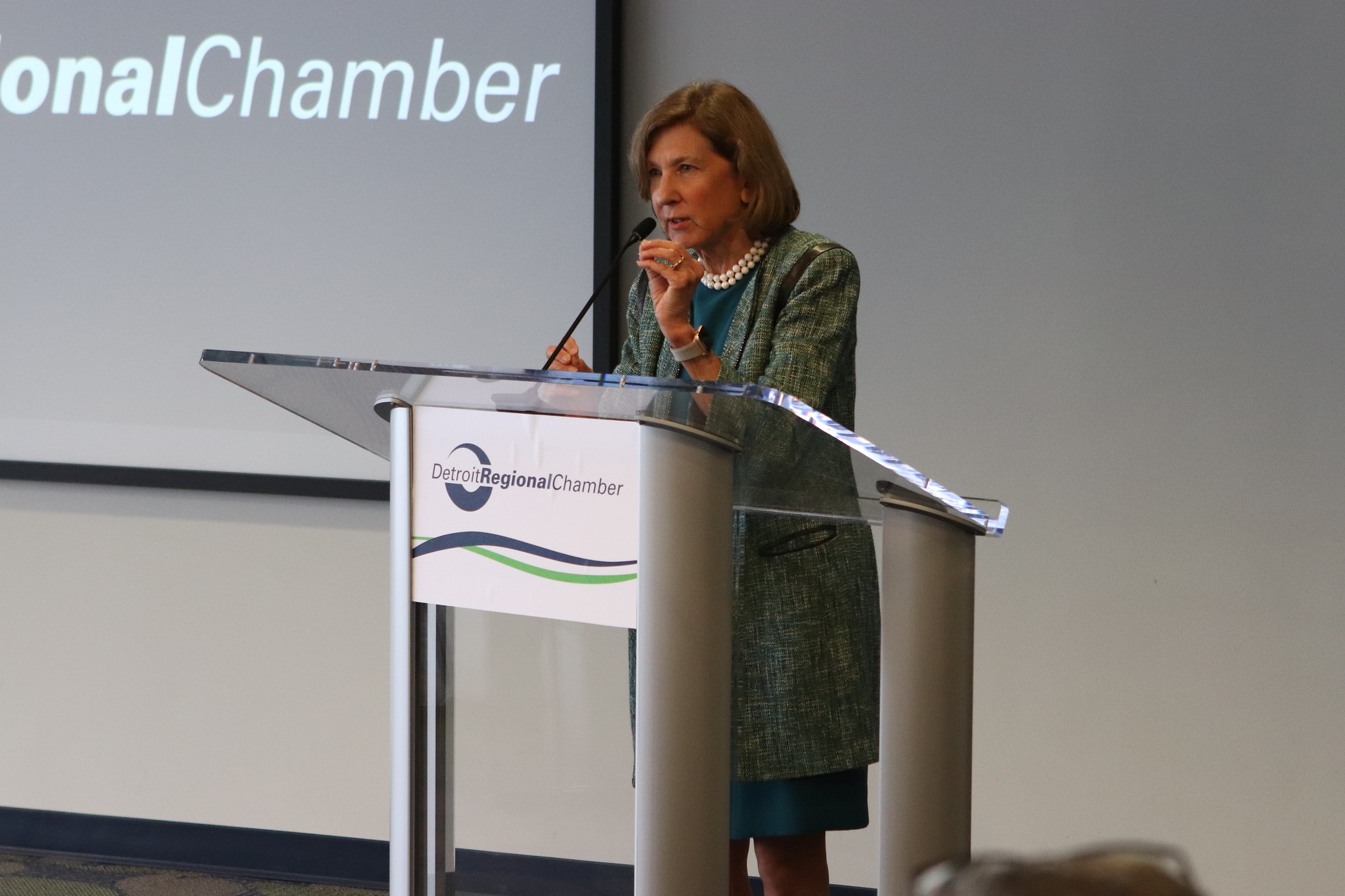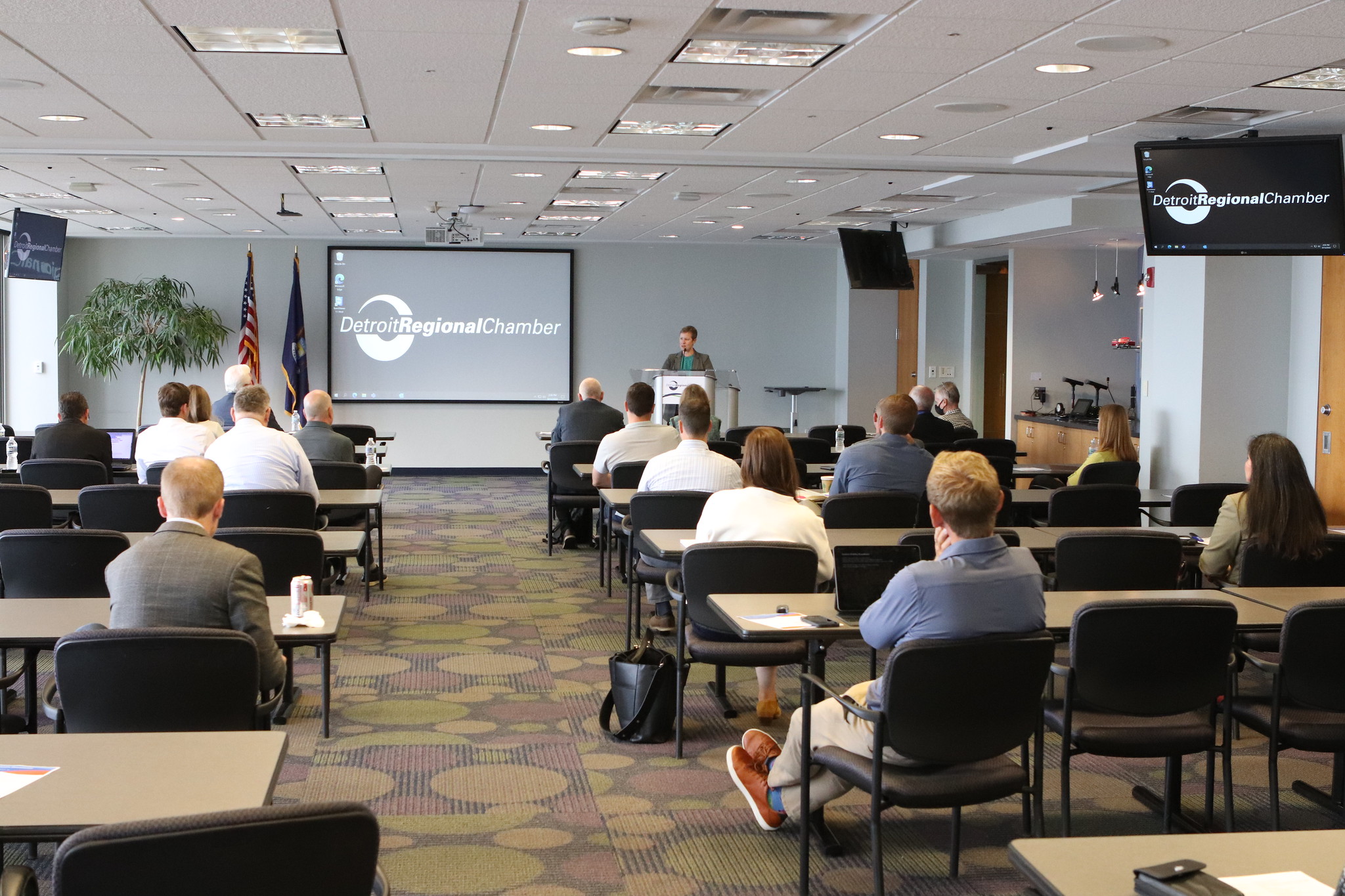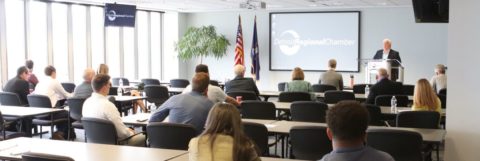Over 40 government, industry, and academic stakeholders convened for a roundtable hosted by MichAuto at the Detroit Regional Chamber on Sept. 12 to discuss Michigan’s leadership in the outdoor mobility industry, which has an incredible depth of specializations, including outdoor recreational and marine vehicle electrification, multimodal charging, and much more.
Michigan Must Focus its Attention on Innovation in Outdoor Recreation
Brad Garmon, director of the Michigan Outdoor Industry Office, led with a summary of the last Outdoor Mobility Roundtable that MichAuto hosted in Traverse City on Aug. 1, which concentrated on how Michigan is redefining and reorienting the outdoor recreation industry. From this conversation he concluded that moving forward, Michigan’s outdoor recreation industry will no longer be focused on just travel tourism and parks and recreation. Garmon explained, “now outdoor recreation is technology, outdoor recreation is innovation, and outdoor recreation is making the future happen.”
As an opportunity state, Michigan has the chance to leverage this blending of outdoor recreation, mobility, and talent to bolster the industry by investing in research and development. Polaris, an American automotive manufacturer of motorcycles, snowmobiles, and all-terrain vehicles, has already made large investments to electrify their products and keep up with the quickly changing industry.

Brad Garmon, director of the Michigan Outdoor Industry Office
“Michigan is poised to lose this or take this now,” said Garmon, “it is ours to win or lose.”
For the state to be successful, it needs to swiftly act by creating funds and programs that target outdoor recreation as innovation, which other states have already done.
“Conversations that were sparked in Traverse City prompted immediate follow up with grant opportunities and projects. All it took was a little focused attention on this industry and what their needs are as they innovate,” he said.
It will be important to bring projects to life and into the demo phase where people can actually interact with new technology.
Strategic Opportunities for Michigan Lie in the Outdoor Recreation Industry
Chris MacInnes, president of Crystal Mountain, emphasized the role of outdoor recreation in the mobility space and the unique and strategic advantages that it presents in Michigan. As the “maker state,” Michigan is bolstered not only by its reputation for manufacturing sophisticated and technologically advanced products in the mobility space, but also by its environmental diversity, its talent pool, and its four-season outdoor industry.
With the second-most diverse crop base in the U.S., Michigan boasts strong urban and rural assets that help the state foster resilience. In addition to the mosaic of cultures and diverse skillsets that contribute to a strong talent pool, the state has a robust four-season outdoor recreation industry that brings in $9.5 billion to the economy annually and supports 108,000 jobs.

Chris MacInnes, president of Crystal Mountain
The outdoor recreation industry also helps to make the state’s beautiful outdoor assets more inclusive. MacInnes described how Crystal Mountain’s partnership with the Detroit Outdoor Coalition has connected communities across the state to outdoor recreational opportunities that may not be available to them otherwise. While children from Detroit head up north to experience winter sports, their counterparts from northern Michigan head downstate for an introduction to the recreational and cultural assets of Detroit and Southeast Michigan.
“The last strategic advantage that we have is being surrounded by 20% of the world’s fresh water,” said MacInnes. She noted that as climate change makes other regions of the U.S. less inhabitable, there will be a migration to northern regions, which will lead to economic growth in those areas. Michigan is in a geographic sweet spot, and we need to leverage that.
Michigan’s natural resources, outdoor recreation assets, location, diversity, and advanced mobility and manufacturing capabilities give it the opportunity to reshape the image of Michigan. We must position Michigan as a cool place to work, live, play, learn, and call home in order to attract the kind of talent that will propel the state to thrive.
“Michigan’s outdoor recreation industry can help sell this message not only by contributing to quality of life, but also by designing and building outdoor recreation products in Michigan that brand it as a global leader for innovation, manufacturing, and healthy and inclusive lifestyles,” said MacInnes.
Michigan Economic Development Corporation (MEDC) Enhances Strategic Plan to Include Outdoor Mobility
Jen Nelson, chief operating and customer experience officer at MEDC, confirmed that outdoor recreation will be a critical part of Michigan’s future growth by saying, “we in Michigan are uniquely positioned to lead not just in the manufacturing of cars, but also converging mobility with the outdoors in new ways to grow our businesses and strengthen our communities.”
In the refresh of its strategic plan in 2022, MEDC has focused on fitting mobility into each of six focus areas:
- Attracting, retaining, and growing business
- Growing talent
- Supporting vibrant, growing communities
- High-tech innovation
- Supporting small business
- Marketing the state
Within this strategic plan are focus industries that include automotive manufacturing, engineering, design, tourism, and outdoor recreation companies that operate on both the state and regional levels because, “mobility is more than cars.”

Jen Nelson, chief operating and customer experience officer at MEDC, addresses the room.
Nelson noted that while MEDC has traditionally taken a one-size-fits-all approach to delivering resources, its new strategic plan will focus on working more closely with local and regional economic development organizations to meet specific priority goals.
She said, “we want to make sure that we are regionally relevant in how we’re delivering our tools and resources throughout the state. The mobility solutions in the UP are going to be different that the mobility solutions in Detroit, and that’s okay.”
To achieve this, they have combined their business development and community development teams to take a more holistic approach to providing support and solutions.
MEDC is committed to a “Team Michigan approach,” meaning it is working more collaboratively than ever to solve problems and create opportunities. Nelson reiterated Garmon’s sentiment that the time for talking is over and “we need to start acting so we can win.”
Additional Considerations That Can Lead to Tomorrow’s Big Wins
Glenn Stevens Jr., MichAuto’s executive director and vice president of Automotive and Mobility Initiatives at the Chamber opened the floor for discussion by first asking Angela Ladetto of the Detroit Regional Partnership (DRP) about the Build Back Better grant they recently received. Ladetto explained that while DRP is the grant manager and leading the mission to find sites available for companies to immediately occupy, they have partnered with TechTown to accelerate the growth of mobility startups, University of Michigan Economic Growth Institute to help companies develop exit or pivot strategies, Michigan Office of Future Mobility and Electrification to increase equitable access to the state’s testing and proving sites, and the Southeast Michigan Council of Governments to provide the startups with the talent they need.
She said, “the pieces are meant to work and click together so that each of the projects should be making recommendations as that company moves along the business cycle so they can fully take advantage of all the projects in the works.”
Garmon chimed in to note that the University of Michigan Economic Growth Institute is also doing work in the UP to measure the impact of outdoor recreation from a tourism standpoint on nearby counties. He wondered how we can prevent redundancies in projects by collaborating with ongoing projects such as this to include an outdoor mobility perspective.
Ladetto emphasized that, “a critical piece of this grant work is making sure that all the pieces are equally accessible, and we are inclusive and accessible in our intent to ensure that this is completely opened up diversity-wise. That’s a piece that has been missing across the state.”
She clarified that she meant not only racial diversity, but geographical as well, noting that location changes your mobility needs. It is essential to bring jobs into the community where people live and not making them take an arduous commute.
Joel Thiel of Innovate Marquette and added that the outdoor recreation industry is experiencing near-unregulated growth and “the wheel of innovation is happening all the time.” On the other hand, the automotive and mobility industry is far more regulated, and can’t develop as quickly. Naturally, the fast-paced innovation of one will bleed into the other and create a mutualistic relationship.

